
Riverside Lifelong Health:
Empowering Aging Patients to Control Their Destinies
“As I age, I will control my destiny in a place of my choosing.”
— Riverside Lifelong Health vision statement
Every day since January 1, 2011, 10,000 Americans have turned 65, a trend that’s expected to continue – every day – until the year 2030. Ask any one of these individuals what they want most as they age, and the answer invariably comes back, “good health, and the ability to maintain my independence.” Dig a little deeper, and a more thoughtful response often follows: “I don’t want to be a burden. I want to stay in my home for as long as I can.” In other words, “I want to control my own destiny.”
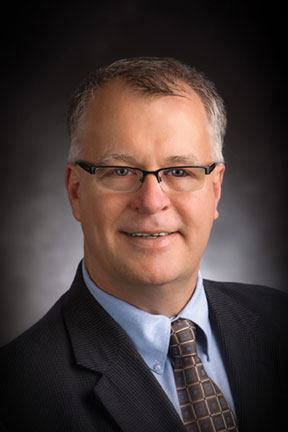
The job of providing medical care for these aging Americans falls to a healthcare system that is already overburdened, as the cost of providing care continues to rise. And while Americans may be living longer, they’re not necessarily living healthier. According to the latest data from the federal Centers for Disease Control and Prevention, at least 70 percent of American adults are overweight and even obese, while 26 percent have diabetes and 31 percent have hypertension – all of which points to an even greater financial strain on the system. In fact, the Centers for Medicare and Medicaid Services report that 15 percent of the nursing home population in America is under 65 years of age, having acquired geriatric conditions years before reaching that milestone.
To Riverside Health System, it makes more sense to invest in keeping people healthy all throughout their lives through coordinated, integrated care. And as they age, Riverside’s innovative Lifelong Health Division empowers patients to live the way they want to live, by creating an atmosphere in which they can grow older gracefully and independently.
At Riverside, age really isn’t ‘Just a Number’
In 1935, the Committee on Economic Security proposed 65 as the retirement age under Social Security, and that number has become a milestone for crossing from middle to old age. When Riverside looks at age, however, it uses a more expansive definition, dividing patients into three distinct categories, explains Dr. Kyle Allen, Vice President of Clinical Integration and Medical Director for Geriatric Medicine and Lifelong Health:
• Active – healthy, living independently, playing tennis, etc.;
• Chronic – dealing with three or more chronic illnesses like hypertension or diabetes;
• At risk – the frailest patient, in need of intensive nursing home care.
“We want to empower those we serve, regardless of age, disability or situation,” Dr. Allen emphasizes, “recognizing that each experience is different, depending on the patient’s individual medical and personal needs.”
Over the last thirty years, Riverside has developed an unrivalled network of services providing focused care and expert capability to its aging community.
“We’ve had extraordinary leadership under visionaries like former CEO Richard J. Pearce and former Senior Vice President Michael Martin, a gerontology trained administrator who led our aging related services for more than 27 years,” says Robert Bryant, Senior Vice President of Riverside Lifelong Health and Aging Related Services Division. “And that well-founded tradition is continuing under the leadership of Bill Downey, the current CEO of Riverside Health System, as well as Dr. Allen, who we were fortunate enough to recruit from Ohio. Dr. Allen is Board certified in geriatrics and family medicine, and is nationally recognized as a thought leader in the field of caring for older adults. Bringing him to Riverside reflects our commitment to expanding our services to meet the needs of our growing community. Dr. Allen is a strong believer in person centered care, innovation and working collaboratively to coordinate care – which are the very foundations of Riverside Lifelong Health.”
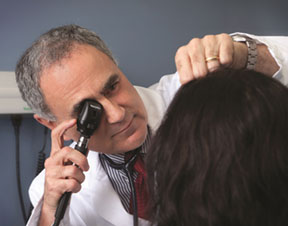
Continuing the legacy of dedication and commitment.
“Based on our experience, the expertise of our professionals and the dedication of our team, we have developed a series of thoughtful commitments to patients, their families and caregivers,” Bryant emphasizes. “And we’ve turned those commitments into practices and protocols in accordance with Riverside’s Care Difference Philosophy: ‘putting patients (their families and caregivers) at the heart of all we do to ensure the highest safety and quality, treating every patient with kindness and respect, reflecting a fundamental belief that healthcare is a lifelong relationship that spans the continuum of need.’”
Riverside is committed to clinical models of care that treat the whole patient.
It begins with Riverside’s innovative Patient Centered Medical Home model of organizing primary care.
The Patient Centered Medical Home is an approach that emphasizes interdisciplinary care, coordination and communication among all medical providers, at every step of the patient’s healthcare experience. “The care is comprehensive,” says Dr. O. T. Adcock, Service Line Chief for Primary Care and a family medicine physician with Riverside Medical Group. “We provide daily care to children and adults of all ages, but our biggest focus is working with our geriatric population.”
For Riverside, working with the geriatric population means taking care of 7,000 older adults each day, who require varying levels of care and different services. The Patient Centered Medical Home is the coordination and communications arm that ensures each provider knows what the other providers are doing, and that patients and their caregivers know as well. “We schedule appointments, tests and lab studies,” Dr. Adcock says, “and ensure follow-up and referral as appropriate, whether to our ACE unit, one of our rehabilitation facilities, a skilled nursing home, an assisted living facility, physicians house calls practice, skilled home health care, or hospice. The Patient Centered Medical Home provides access to the full complement of medical care.”
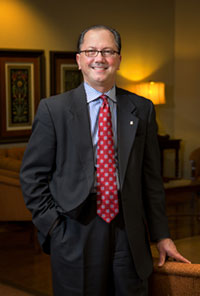
The Individual Plan of Care.
When aging patients require more than in-office medical care, Riverside’s Care Navigators work with them and with their caregivers to determine exactly what’s needed, and help align those needs with the expanded services Riverside offers. As with all aspects of care at Riverside Lifelong Health, it starts with talking to the patient, family and other caregivers, and asking some fundamental questions: “What do you want? What matters most to you? What are your goals? What do you want to accomplish? Where do you want to be?”
Once the answer is known, explains Patricia Russo, Vice President of Care Management, “We develop an Individual Plan of Care, a specific care plan tailored to each patient’s situation, looking at the patient’s function, cognition, ability to pay for medications, access to nutrition and fresh air, interests, in addition to clinical presentation.”
Riverside’s Continuing Care Retirement Communities – a Lifestyle Choice
For individuals who seek the ease and sociability of retirement home living, there are many choices today. One of the most innovative and popular options is the “continuing care retirement community,” or CCRC. CCRCs are specifically designed to meet the lifestyle and health needs of older adults throughout their retirement years. Each of Riverside’s three CCRCs offers independent living apartments and homes, as well as assisted living, skilled nursing, memory care, and rehabilitation on one campus. Because the full continuum of care needs is anticipated and delivered in one location, residents living at each of these communities can avoid having to move if their needs—or the needs of their spouse—should change.
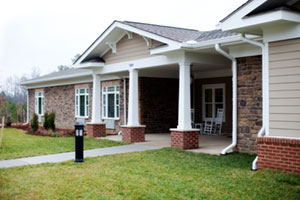
Riverside currently operates three Continuing Care Retirement Communities across the region: Warwick Forest, Patriots Colony, and Sanders (home of Heron Cove), each with its own unique identity and brand of care. Each offers independent living apartments and homes, as well as assisted living, skilled nursing, memory care, and rehabilitation on one campus. Because the full continuum of care needs is anticipated and delivered in one location, residents living at each of these communities need not move if their needs should change.
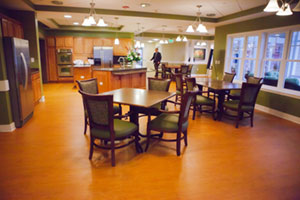
Sanders Retirement Village has been caring for residents on the Middle Peninsula for more than 50 years. Patients who need the structure of more extensive, long-term care often reject the idea of residential care because they fear losing many of the things they value, including a sense of control over their lives and their environment. Riverside Health System is changing the way care is delivered in these settings, reflecting a new culture that is all about patient choice. Within Sanders is the innovative community known as Heron Cove, which features the framework known as the Household Model. Heron Cove sheds the institutionalized regimentation, the top-down management emphasis on efficiency first that is the stereotypical image of the traditional “nursing home,” focusing instead on relationships and choice. Residents make decisions about how their household will function and about how they will manage their own personal lives. Heron Cove’s approach recognizes and fosters dignity, respect, love, and privacy – values every individual needs.

In 1988, recognizing the growing needs of the Peninsula’s aging population, Riverside opened its first retirement facility, Warwick Forest. Today Warwick Forest offers the entire continuum of care: Independent Living, Assisted Living, Nursing and Memory Care, as well as Rehabilitation.
Patriots Colony was founded by a group of retired military officers who saw the need for a community dedicated to those who shared the common bond of service to country. They approached Riverside Health System with their plan, and in 1996, Patriots Colony opened in 1996. Today, Patriots Colony is a Continuing Care Retirement Community offering all levels of care on one expansive campus.
Patriots Colony’s health care services, including The Berkeley Assisted Living, Springhouse Memory Support and The Convalescent/Rehabilitation Center, are open to the public. Reflecting its origins, Patriots Colony’s Independent Living section is restricted to retired and former (honorably discharged) officers of the seven uniformed services, retired and former civilian employees of the federal government (grade GS-7 & above), and their spouses or widow(er)s.
Riverside is committed to serving patients who wish to stay in their own homes.
ChooseHome: retirement community care – available in the home.
The Commonwealth of Virginia recently passed legislation allowing for the development, licensing and regulation of “community-based continuing care” programs, also known as “life care at home” or “continuing care at home” programs. Riverside’s ChooseHome option offers patients 60 and older a comprehensive and cost-effective option to long-term care insurance, bringing the individualized resources patients need to continue living safely and comfortably in their home. These resources include wellness and home safety assessments and individualized plans, in-home technologies, medication dispensing units, adult day services, home health aide, homemaker assistance and personal care, among others as needed.
Recognizing that as patients’ conditions change, so do their needs, ChooseHome provides members with a Personal Services Coordinator (or navigator), who functions as an advocate and guide, helping patients and their families determine their goals and which programs best meet immediate and future needs at every step of their care.
The ACE (Acute Care for Elders) model of care.
Dr. Allen was one of the investigators who helped study how to improve hospital care for older adults and participated in the clinical trials of the Acute Care for Elders Model of Care. He has helped implement the ACE model of care at Riverside, which combines principles of geriatric assessment and quality improvement. The ACE model is designed to foster independent functioning of older patients during their hospitalization, to reduce hospital- associated conditions, e.g. confusion, and to prepare them to function at home as well. The ACE program at Riverside provides patients and caregivers with tools and support to encourage them to more actively participate in the transition from hospital to home, and once home, to master effective self-management skills. Riverside has also partnered with the Eastern Virginia Care Transitions Partnership, which uses the Coleman Care Transitions model, a model that assigns a coach to patients and their caregivers to help them better understand their medication schedule, to know what to be alert for with their medical condition, to know about appropriate follow-up care and maintaining a personal health record. This coaching model is activating patients and caregivers to become more confident in their self-care of their health. In addition, because RHS knows how important care transitions are, the ACE unit is innovatively creating a simulation of what being at home will be like, with nursing and therapy staff providing education and skills before discharge, to help patients and caregivers prepare adequately.
“These transition times can be particularly challenging and stressful on patients,” Russo says. “It’s well understood that any time a patient moves from one care setting to another – whether from inpatient to skilled nursing facility or from inpatient to home, even from primary care to a specialist – there is the opportunity for miscommunication, so part of our focus is always to insure a smooth transition from one provider to the next. We make sure the patient and the family understand the transition plan, so that when they move from one venue to another, they’re a part of the process, as well as the care team.”
“We believe in activating the patients in self-care, self-management as much as possible,” Dr. Allen adds. “A large part of that is teaching them how to be a partner.”
Critical to the success of ACE – and all of Riverside Health System – is the initiative known as NICHE – Nurses Improving Care for Health System Elders.
NICHE is the leading nurse-driven program designed to improve the care of older adults across the health system. It provides nurses with education and best practice models for responding to the unique needs of older adults.
“We opened our ACE unit in October 2013,” says Kathleen R. Fletcher, a Doctor of Nursing Practice who serves as Director of the Geriatric Nurse Clinical Practice Program at Riverside, and was instrumental in establishing NICHE at Riverside. “The unit consists of 24 private rooms dedicated to those patients who are over the age of 55, typically living at home, who benefit from our team approach to rehabilitation. There are daily rounds on the ACE unit based on the interdisciplinary plan of care for each patient,” Dr. Fletcher explains. “The team includes a physician, a social worker, nurses, physical therapists, all working with patients who may be struggling with different aspects of day-to-day activities. We work aggressively with them, providing services as needed to transition them back to home.” NICHE relies on evidence-based protocols that allow for intervention by nurses, which may well preclude escalated conditions that might result in an ER visit, or even hospitalization.
There are no hard and fast rules for what constitutes qualification for ACE care at Riverside, Dr. Kennedy notes, because “people age and develop chronic conditions differently at different paces. That’s one of the reasons why this utilization of a model for care that enhances the skills and knowledge sets and capabilities of people taking care of older adults enhances our ability to prevent complications and hospital readmissions.”
In addition, notes Dr. Terris Kennedy, Riverside’s Chief Nursing Officer, “NICHE provides us with a geriatric nursing research curriculum, as well as a patient care curriculum, to enhance and heighten Certified Nursing Assistance observation skills and geriatric nurses’ ability to intervene, based on what they observe in real time. It provides us a laboratory in terms of how we’re caring for older adults with chronic co-morbidities, which we can then translate and take from the ACE unit to our smaller community hospitals.” Riverside is also using the NICHE program through all its acute care and post-acute facilities. The National NICHE office is interested in this work and has been working closely with Dr Fletcher to understand better how NICHE can be used system wide to improve care of older adults.
CEALH – helping patients control their destinies by ensuring that both they and their families fully understand their situation and the options available to them.
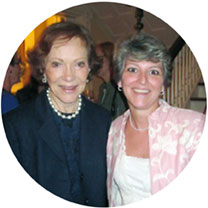
The Riverside Center for Excellence in Aging and Lifelong Health (CEALH) provides services ranging from geriatric assessments to teaching individuals with chronic conditions how to manage their symptoms, to providing resources and education for caregivers.
An example is CEALH’s Geriatric Assessment Clinic – one of only six in Virginia – which provides a comprehensive look at each patient, and includes a comprehensive evaluation conducted by a team that includes a geriatrician, a nurse, counselor and physical therapist focusing on memory loss, incontinence, fall risk, depression and medication issues. Referrals are made as appropriate, with follow-up and recommendations for families and caregivers individualized to the findings of the assessment.
Either you are a caregiver, you rely on a caregiver, or you will become a caregiver.
“We recognize that caring for the aging patient also means caring for the patient’s caregivers,” says G. Richard Jackson, CEALH Executive Director. “We train family members as well as professionals to understand the person they’re caring for and the diseases that patient has.”
Since the “Caring for You, Caring for Me” training, a program of the Rosalynn Carter Institute on Caregiving, was introduced at Riverside, more than 250 family and professional caregivers have enrolled in the five-week program at CEALH, which brings caregivers together in a relaxed setting to discuss common issues, share ideas and learn about available resources. “This program has received Best Practices Awards from both the Southern Gerontologic Society and the Commonwealth Council on Aging,” says gerontologist Christine Jensen, PhD, Director of Health Services Research. “The cost of the entire course is $35, which includes educational resources.”
It also includes a caution: caregivers frequently neglect their own health in the stress of taking care of older patients, Dr. Jensen notes. “Their own immune systems can become compromised, so we tell them to be sure their own physicians know they’re caring for an older patient. And we share Mrs. Carter’s entire quote with them: ‘There are only four kinds of people in the world: those who have been caregivers, those who are currently caregivers, those who will be caregivers, and those who will need caregivers.’”
Much like the “Caring for You, Caring for Me” program, CEALH also trains leaders to go out into the community to hold group sessions for individuals suffering from chronic diseases, to help them understand how to make decisions that will positively affect their health. “We talk about diet, exercise, stress reduction, spirituality – anything and everything that would help them manage their disease,” Jackson explains.
CEALH also serves as the Research and Discovery arm of Riverside Lifelong Health.
“In fact, we’re a hybrid of an interdisciplinary aging research agency and a provider of special services for older adults,” Dr. Jensen explains, “which allows us to conduct clinical trials designed to explore and evaluate new treatments and medications, as well as clinical and academic research that can be directly applied to the older population. Whenever we’re involved in one of those programs, we’re also studying and documenting it for future use.”
Both Jackson and Dr. Jensen emphasize that while the specialized services CEALH provides are available on a sliding pay scale, “Nobody who knocks on our door is denied service because of the inability to pay. Every grant we write contains a request for scholarship funds for marginalized patients.”
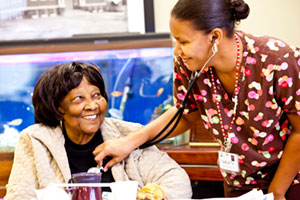
PACE – A Program of All-Inclusive Care for the Elderly.
The PACE model is centered on the belief that it’s better for the well-being of older patients with more chronic care needs and their families to be served in the community whenever possible. Riverside PACE serves individuals who are age 55 or older, who are certified by the Commonwealth to need nursing home care, who are able to live safely in the community at the time of enrollment, and who live in a PACE service area. There are six PACE centers within the Riverside Lifelong Health system, overseen by Medical Director Dr. Paul Evans, a Board-certified geriatric and family medicine physician.
“One of the most positive aspects of PACE is the acknowledgement that taking care of older patients isn’t just about medicine, it’s not only providing medical care,” Dr. Evans says. “It includes all the other parts of someone’s life – their finances, their ability to get to social events, the ability to get adequate food and housing, appropriate resources. It recognizes the importance of things like clean air, clear water, housing free of insects and lead paint, all other social determinants of care and health. PACE acknowledges what doctors have always known,” Dr. Evans says, “that there’s so much that goes into poor health, poor outcomes, that’s out of the control of medicine.”
The benefits of participating in the PACE program are multifaceted, and include extensive outpatient services, home healthcare services, inpatient hospital care and nursing facility care.
“Even when there’s not much we can do for these patients medically, the things we can do for them through PACE can help them achieve better health, and be more functioning,” Dr. Evans says. “We work closely with the families of our patients, providing aides during the day or at bedtime when required. We modify the home if necessary, as the patient’s needs dictate: we provide aides in the home, or at bedtime, we install ramps and even provide bus transport services. The focus is on what can keep patients at home, what will maintain their highest level of function, what will bring them the most joy, and what will support their families.”

Invaluable and Innovative Tools for In-home Patients and Caregivers
“Technology has allowed us to provide products and services for our patients that keep them safer, and enable them to go home from a hospital or nursing home earlier than they would if they didn’t have access to such products,” says Daniel Ballin, a physical therapist and Administrator of Riverside’s Wellness and Outpatient Services. He’s particularly excited about Riverside Alert, a personal emergency response system (PERS) that features immediate 24/7 access to Ask Riverside with just the touch of a button. “This can be a great comfort to patients who have questions or concerns,” he says, “as they can get answers virtually instantaneously. It’s an equal comfort to family members who aren’t local, knowing their loved one has ready access to help.”
 A medication dispensing service is also available. It organizes complex drug regimes, and provides both audio and visual reminders to the patient, including a missed dose alert. Emails are provided to caregivers, who can also monitor patient compliance online. “This is a vital service, because one of the primary reasons older patients are admitted to the hospital is medication mismanagement.
A medication dispensing service is also available. It organizes complex drug regimes, and provides both audio and visual reminders to the patient, including a missed dose alert. Emails are provided to caregivers, who can also monitor patient compliance online. “This is a vital service, because one of the primary reasons older patients are admitted to the hospital is medication mismanagement.
Technology has also enabled remote vital sign management. “Our nurses will visit patients at home and leave a blood pressure monitor,” Ballin says. “We can even track blood sugar, glucose and weight five days a week. We can recognize early warning signs, and immediately send nurses out to check on patients when needed.”
House Calls: a new spin on an old medical tradition.
Under the direction of Dr. Teresa McConaughy, a Board-certified family medicine physician, Riverside’s House Calls Practice provides primary healthcare services to home-limited adults unable to access regular medical care. “It was on Dr. Allen’s wish list when he came to Riverside,” Dr. McConaughy says. “He created a business plan and model to make it work, and I was immediately interested. I had a large geriatric practice, but I wanted to do geriatrics in a different way, and this presented that opportunity.”
With House Calls, Dr. McConaughy and Dr. Travers Edwards function as their patients’ PCP. “Some of them have family doctors, but they’re too sick or too weak to visit them, so we take on their care,” Dr. McConaughy says. “We also get referrals from home health agencies who ask us to step in on behalf of their patients. We coordinate all medical care, including specialty services, whatever they need that we can treat in the home.”
House Calls physicians are able to spend more time with patients, and develop warm and ongoing relationships with these patients, and putting a human face and touch on the technologies available to them through Riverside’s Lifelong Health division. They find that they’re able to have much more meaningful conversations with patients about their care – and about their lives – when they’re comfortable in their own homes.
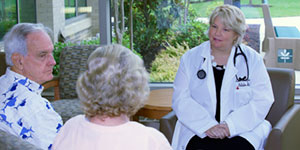
Compassionate care when it’s most needed.
For patients with advanced illness, the concern turns to one of the most sensitive decisions in a family’s life: what to do as the end of life approaches. Words like ‘palliative care’ and ‘hospice’ can seem foreign and frightening to patients at a time when they feel most vulnerable and their family members feel helpless.
It doesn’t have to be that way, says Dr. Laura Cunnington, Riverside’s Medical Director of Palliative Care and Hospice Services. “We know these are very difficult times for everyone involved. It’s hard to contemplate death, especially your own, and it can be even harder to talk about it with people you love, especially if that death seems imminent.”
The hope is that physicians will talk to their patients about what they want as they age, Dr. Cunnington notes, “but these conversations can be difficult for doctors as well. They have special relationships with their patients, and it can be hard for them to accept the fact that a patient might be dying. I do a lot of education, one-on-one with doctors, in didactic type settings, to give them better skills as well.”
Advance Care Planning Facilitators assist patients and families.
To assist patients and their families (and when appropriate, care providers), Riverside offers the services of trained Advance Care Planning Facilitators, who are certified by Respecting Choices®, an internationally recognized advanced care planning program. “These facilitators talk with patients and their families about quality of life issues,” says Carol Wilson, Director of Palliative Care and Advance Care Planning. “They ask the same fundamental questions: ‘What are your goals? What do you want to accomplish? Where do you want to be?’” There’s no medical jargon in these conversations, Wilson notes. It’s just about finding out what the patients want.
With this information in hand, an Advance Care Plan can be created and documented and made a part of the patient’s medical record. Patients are satisfied that their dearest and most personal wishes will be honored when they can no longer speak for themselves, and both families and healthcare providers are relieved of the burden of having to make decisions that might be in opposition to those wishes.
Riverside care providers can then proceed to honor those wishes in all aspects of the patient’s care, whether on palliative care or in hospice, delivering and coordinating the highest quality and most appropriate care.
“That’s what Compassionate Care is really about,” Dr. Cunnington says: delivering team-based care at the end of life, focused on the patient, in relief of suffering, and provided in the setting the patient wishes.
It’s also about educating the community about the resources Riverside offers to patients and families, particularly with regard to Advance Care Planning. Riverside Lifelong Health is part of the Advance Care Planning Coalition of Eastern Virginia, which also includes Sentara, Bon Secours Hampton Roads and Chesapeake Regional Medical Center. Branded “As You Wish,” the Coalition works to increase public awareness of Advance Care Planning among all adults over the age of 18, and those filing Advance Care Planning documents.
Riverside Lifelong Health – making Virginia a great place to grow older.
If Riverside Lifelong Health seems like an overwhelming labyrinth of products, services and initiatives, it’s just as much a roadmap for patients, families, caregivers and healthcare providers to maintaining health and vitality – and to enjoying the wisdom and ease that come with age. And to knowing that the fondest and most deeply held personal wishes will be honored.
With a commitment to caring for older patients that spans more than three decades, earning a statewide and national reputation for excellence, Riverside Lifelong Health is acknowledged as the expert on caring for some of Virginia’s greatest assets – her elder citizens.
For more information visit our website www.riversideonline.com/lifelonghealth. Or call (757) 856-7030

